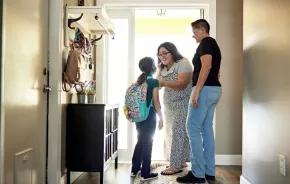Who remembers summertime -- a time when the livin' was easy and the burgers were grilling. Most of us must search deep into our memory banks for those wistful images of bicycle rides, walks in the park and pick-up games of sandlot baseball.
If you were born closer to the 21st century, you might have to rent "Brady Bunch" DVDs to really grasp those summer days of yore. Chances are your busy parents wanted you active and supervised -- and a safe distance from empty playgrounds and solitary trails.
Today, summer is the new fall: a time for fresh beginnings and infinite learning opportunities. In the age of No Child Left Behind, summer's become No Minute Left Wasted.
A summer slide?
In the web article "The Summer Brain Drain," The Family Education Network suggests parents consider the benefits of summer school or summer tutoring. "Summer school can enrich and accelerate learning in areas where kids show a special interest," it says.
The Johns Hopkins University's Center for Summer Learning website weighs in with this view: "Summer 'slide' is another consequence of unstructured summers. The 'slide' means that students tend to score lower on tests of achievement at the end of the summer than they did on the same tests before summer break."
Many camps, as well as summer schools, provide learning opportunities in countless academic disciplines along with their usual menu of swimming, sports and art.
No wonder so many parents are scrambling to enroll their kids in summer classes, math clubs and science enrichment. For students, that means less play and more skill building during the vacation months.
Is that such a bad thing?
Many educators think it's not -- as long as kids strike a reasonable balance between mind-building and mindless fun. "Summer is definitely a time for kids to explore interests and enjoy more freedom," says Sarah Shero, youth and recreation assistant director at the Stroum Jewish Community Center (SJCC) on Mercer Island. "But if they don't keep up with math and reading comprehension, they could lose up to six months of what they're learning."
For the first time, the SJCC will offer a pullout summer tutoring program as an adjunct to summer camp. Kids can opt for one or two hours a week of individualized instruction during the camp day. "The goal in the summer is for kids to maintain their knowledge," says Shero. "It makes it easier on them when they get back to school."
And while kids shouldn't feel overly pressured during summer, they should always be learning, contends Uzma Merchant, owner of the Redmond branch of FasTracKids, an international education enrichment program. "You should expose them to as many things as you can."
Combining play and learning
Stowe Sprague, a Mercer Island mother of three children, ages 9, 7 and 4, likes setting "summer goals" for her kids. "It might be as simple as learning to tie shoes," she says.
Tuned into her kids' strengths and weaknesses, she knows which child needs extra help in math, which in writing. Summertime, she finds, is a chance to jump on those weak spots and build them up. Sprague also values her children's downtime. "We're talking about 15 to 20 minutes a day of reviewing," she says. "They have lots of time to play."
Sprague supplies the older kids with workbooks and texts -- and makes sure they study at the kitchen counter while she prepares dinner. "They protest, but get into the swing," says Sprague. "I think of it as another version of quiet time."
That kind of formal structure is fine -- if a child needs it, says Jeff Sanderson, math instructor and academic dean at Eastside Preparatory School in Kirkland. Sanderson sometimes assigns work over the summer if a student "fails to master" the material taught during the school year, he says. "But if they've done a pretty good job, they should have the summer off."
Sanderson suggests kids engage in enriching summer experiences or summer camps that build on skills learned in the classroom -- such as science camps, computer camps and robotics.
What else keeps kids thinking? Journal writing, creative writing and reading, he says. "While summer should be about play, the smart parent ties that play in with whatever the kids do during the school year." Taking a trip? Talk about what your child learned in social studies or history. Selecting books? Choose something that relates to science. There are plenty of home activities to choose from that combine fun and learning.
In fact, work and play aren't all that dissimilar, according to Frank Magusin, head of The Bush School in Seattle. Kids keep learning all the time. "There's a lot of processing that goes on during downtime -- whether that time's spent reading magazines or creating rules for games," he says.
Some structured summer learning is not a bad thing, especially if a child wants to do it, says Magusin. But save time for fun. "I worry that we are over-programming kids -- and that there are not enough opportunities for them to play and learn how to be together," says Magusin. "It's really important to have time when kids can just be kids."
Linda Morgan, ParentMap's associate editor, writes frequently on education issues.
Originally published in the March, 2007 print edition of ParentMap.









